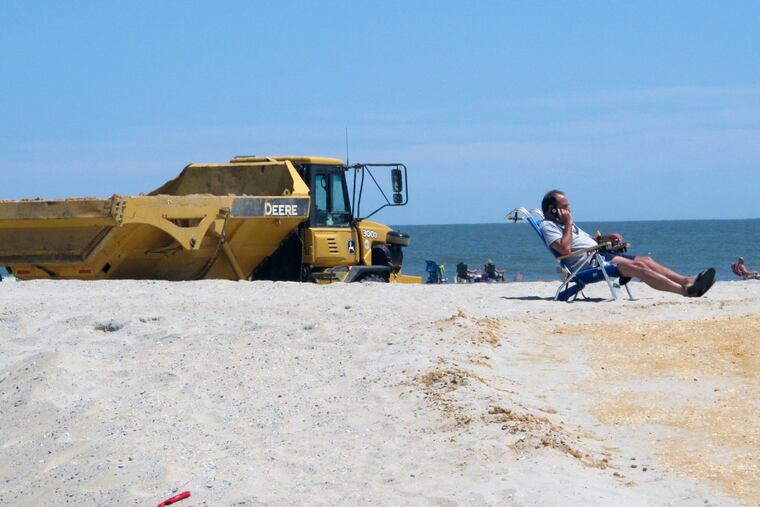Judge: Dune work can resume in Margate, with conditions
With the court having ruled in the Margate challenge, the Army Corps of Engineers is soldiering on, but in friendlier territory: Ventnor.

A federal judge in Camden has lifted the order halting dune work on Margate's beaches, allowing the Army Corps of Engineers to resume the project that has left lakelike ponding that some residents have called dangerous.
"If the construction of the dune and berm system is delayed, Margate may remain unprotected from the ravages of storms during hurricane season," wrote U.S. District Judge Renee Marie Bumb, handing the city a defeat. On Wednesday, Margate officials had asked the judge to keep the order in place, with one city-hired engineer describing the ponds as dangerous "wastewater lagoons."
She did not minimize the problems associated with the dune construction so far, which left several feet of storm water trapped between dunes and the bulkhead for days, prompting health and safety fears and cutting off access to some beaches: Her order requires the Army Corps to fence off any future ponding areas, pump out more than four inches of water, excavate wherever any sludge layer forms from standing water, and erect elevated walkways.
"While many of Margate's witnesses seemed to recognize the possible future harms that the dunes are designed to prevent, Margate understandably stresses the ongoing public health and safety concerns raised during construction of the dunes," Bumb wrote. "Much of the hearing before this court was spent stating the obvious: the current conditions of Margate's beach are not acceptable to anyone."
Bumb urged the parties to view their interests with common goals in mind: protecting the island and minimizing health hazards.
"All parties agree that protecting the entirety of Absecon Island from destruction and devastation by hurricanes and flooding is a critical and worthy endeavor," Bumb wrote. "Similarly, all parties agree that reducing public safety and health hazards such as large ponded areas on a popular beach during the height of summer is also important and necessary. These goals need not be mutually exclusive."
Many Margate residents were distressed by the judge's decision.
"Unconscionable," said Vincent Castronuovo, who has been organizing summer resistance to the Army Corps project.
By Thursday, however, the ponds had been pumped dry.
And in an update on its website, the Army Corps said it was studying the issues created in Margate by the $63 million, federally funded dune and beach replenishment project.
Robert Geist, a spokesman for the state Department of Environmental Protection, was more dismissive of Margate's concerns, blaming them in part on an antiquated drainage system the city has declined to update, and saying its portrayal of current conditions was misleading.
"Margate's attempt to portray this ponding as a new and unprecedented phenomenon is disingenuous at best," Geist said. "It has been a regular part of life in Margate for many years, long before the USACE project began. Even this week, there has been ponding in areas where work on the USACE project hasn't even begun. For decades, the city has dug trenches to attempt to drain water from the bulkhead to the ocean."
Meanwhile, the Army Corps is soldiering on with its $63 million beach replenishment project in friendlier territory: Ventnor.
Officials there announced Thursday afternoon that dune work would begin Saturday at Jackson Avenue, the border with Atlantic City, and move south.
Unlike Margate, Ventnor officials urged its residents and summer visitors to grin and bear it — and to focus on long-term resiliency. The work is expected to last approximately three to four weeks but may move quicker as the project did in Atlantic City, the city said in a Facebook post.
"We understand the frustrations our community has expressed," said Ventnor Mayor Beth Holtzman, "but we encourage our residents, visitors, and business owners to focus on the long-term resiliency it will provide that will outlast the headaches we've endured."
Most of Ventnor already has dunes, and the work will consist of extending the beach. The ponding issue that Margate experienced is likely not to be replicated in Ventnor, where drainage is different, and the Boardwalk covers the area behind the dunes and provides a walkway to the beach.
Army Corps officials said in court Wednesday that similar ponding had occurred during dune work in Sea Isle City but that its residents had not complained.
In Longport, work is not expected to begin until after Labor Day, according to Mayor Nick Russo. He said he was fine with whatever happened from here on out and has been told not to expect similar drainage issues in Longport, which has different elevations and a different drainage system in place.
"We got though Memorial Day, all of June, all of July, first half of August," Russo said. "If they start it, they start it. When they sign up for the project, because of the danger of the work, you can't do this in the dead of winter."